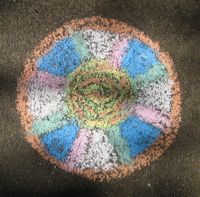
March 22, 2008
Enlightenment

"You do not have to walk on your knees for a hundred miles through the desert, repenting. You only have to let the soft animal of your body love what it loves," says Mary Oliver (1992, p. 110) in her poem called Wild Geese. We do not need to seek and strive for enlightenment, it's something to be settled into, something into which we relax. What I call enlightenment is the end of suffering; anything else is not interesting to me. I am not interested in special powers or some kind of astral plane, just the end of suffering.
Why do we revere people who suffer all their lives in order to end suffering? It is not wise to suffer and it is not wise to model suffering. One man sat in meditation for ten hours a day for fifty years and he attained something. What did he attain? The end of suffering is here and now, not in fifty years, not after endless meditation.
Enlightenment is not hard. Enlightenment is easy; it's the easiest thing in the world. Suffering is hard. We would do well to stop tying ourselves in knots of suffering, to stop telling ourselves that we have to go through some complicated suffering procedure to get out of suffering.
So how do we get enlightened? How do we end suffering? We don't do anything. We stop doing the things that cause suffering, then enlightenment arises naturally. Enlightenment is our natural, healthy state. You've been enlightened and I've been enlightened. Lots. It's no big deal. It's a small deal. There are supposedly enlightened people who say that an enlightened person will neither say that they're enlightened nor say that they're not enlightened. That just sounds crazy, and complicated.
The difference between suffering and non-suffering is miniscule. That's true for all people at all times. No person is more enlightened than another. The difference is so tiny that it is absurd to aspire to lifetimes of spiritual practice to "attain" something. And it's ridiculous to raise one person onto a pedestal above others. That just perpetuates suffering by disempowering the devotees from taking the tiptoe step it takes to end their own suffering. "You are your only master. Who else?" says the Buddha (1976, p. 43).
Here is the equation: Suffering = Pain x Resistance. Suffering is reduced to zero when either pain is reduced to zero or resistance is reduced to zero. We cannot always prevent or remove all pain, but we can stop resisting. This is the thing that must be stopped, the thing that causes suffering. In fact we don't have to learn not to resist, instead we must unlearn resistance. It takes effort, care, energy, and time to resist. It is effortless to surrender into non-resistance.
The gap between suffering and non-suffering is only as wide as what we are resisting. The only thing we can resist is what's happening right now. In any moment, there is so little to resist. We play games with the present, and it really is a lovely present, to make it seem like there's more to resist. We map the past and the future onto the present and tell ourselves that to accept what is requires some mammoth task of accepting what isn't: what was, and what one-day might be. What is right now? What are you resisting? Experiment with surrendering into what is right now? You are what is right now anyway, and you can't prevent it, so why resist it, why suffer?
When we stop resisting we begin accepting. When we can accept all the time, that is unconditional acceptance, and that is love. And love is what we are. But acceptance is not weak, it does not make us into doormats. All change comes from acceptance. It is impossible to change anything until it has been accepted. You don't change your lightbulb until you accept that it's blown. A CEO doesn't set about increasing gross margin until she accepts that it's lower than desired. And we'll do nothing about child abuse until we accept its reality and its effects. True love is not weak, it is infinitely empowering.
There's something wonderful to be discovered: what we really are, right now.
References
Buddha (1976). Dhammapada: The sayings of the Buddha (Thomas Byrom, Trans.). Boston, Massachusetts: Shambhala. (Original words supposedly spoken by Buddha (563-483 B.C.E.), probably first written during first century before Christ)
Oliver, Mary (1992). New and selected poems, volume one. Boston, Massachusetts: Beacon Press.